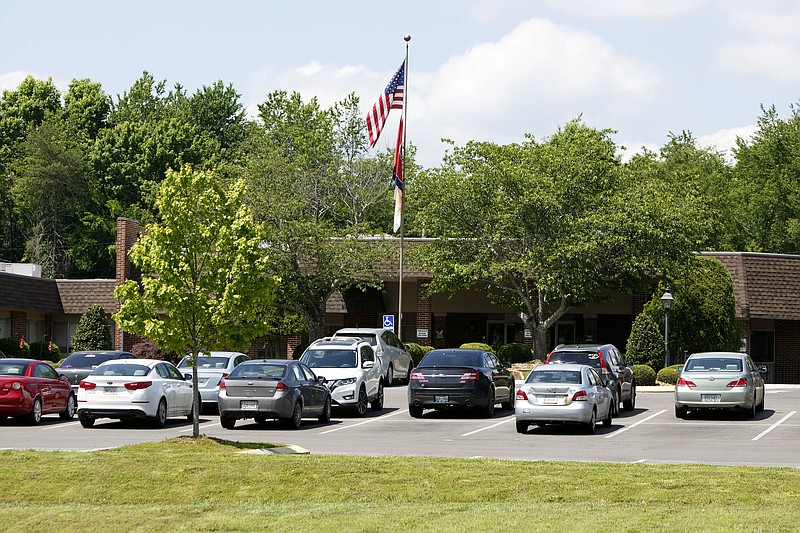More than 40% of the region's coronavirus-related deaths have occurred among residents of nursing homes, a figure pushed up after two new resident deaths reported Tuesday at the Life Care Center of Athens in McMinn County, Tennessee.
Tuesday's deaths bring the region's COVID-19 fatalities in nursing homes to 25, including 14 at the Athens-based Life Care and 11 at Calhoun Health Care Center in Gordon County, Georgia.
That compares to 59 total coronavirus-related deaths in Hamilton County and the 18 surrounding counties in North Georgia and Southeast Tennessee, so nursing homes account for 42% of deaths in the region.
"It's a real front that these long-term care providers are dealing with, just because of the nature of the long-term care facilities and the close proximity that residents and staff are in," said , executive director of the Tennessee Health Care Association. "It's a real challenge for them battling this type of virus."
More than 16,000 nursing home residents and staff have died in the United States from COVID-19, representing roughly a quarter of the nation's known coronavirus deaths, according to AARP. Experts say that figure is an undercount, because the quality of data varies widely across states.
In Tennessee, COVID-19 deaths in long-term care facilities - which include both nursing homes and assisted living centers - account for about 36% of all COVID-19 deaths, according to the state.
Long-term care facility deaths in Georgia make up 49% of the state's coronavirus-related fatalities, and the figure is 47% in Alabama.
Although most people with coronavirus go on to recover, older adults - particularly those with underlying health conditions - are most susceptible to fatal COVID-19 infection.
COVID-19 spreads easily in group settings such as nursing homes and may be spread by people who don't show symptoms.
People who live in long-term care facilities are particularly vulnerable to the coronavirus due to the likelihood they are already diagnosed with high-risk health conditions that make it harder to overcome the disease.
By no means are all cases fatal. The 25 deaths at the two centers hardest hit by COVID-19 in the Chattanooga region came amid a total of 178 known cases at those facilities.
The Tennessee Department of Health tracks COVID-19 deaths and "clusters" in long-term care facilities - defined as "two or more confirmed COVID-19 cases in residents or staff within 2 incubation periods (or 28 days)" - which are updated online in a weekly report.
The state's COVID-19 Unified Command spokesman Dean Flener said all COVID-19 related fatalities in long-term care facilities in Tennessee are listed in that report. However, the report isn't always current.
Due to their high-risk settings, Tennessee is requiring assisted living centers, nursing homes, senior residential and skilled nursing facilities - which together employ more than 70,000 health care workers serving 70,000 residents in more than 700 licensed facilities - to be tested for COVID-19, saying financial and operational support for the testing is available from the Tennessee Department of Health and Tennessee National Guard.
Gov. Bill Lee originally set a goal of testing all residents and staff of the state's long-term care facilities by May 31, but has since acknowledged it could take more time to reach that goal.
Hamilton County Health Department Administrator Becky Barnes went over the process during a news briefing last week. Barnes said facilities are responsible for determining how many staff and residents need to be tested, whether they'd prefer to use the state or a private lab, and then coordinating with the state to schedule a testing date so as not to overwhelm labs.
As of Friday, 115 long-term care facilities had completed testing and 173 were in the queue to be tested, according to an email from Flener.
In Hamilton County, as of Wednesday, all but one of the skilled nursing facilities have been tested or are scheduled to be tested by June 19, according to a health department spokesman.
Samples, with the health care association, said facilities have asked for help with testing since the early days of the pandemic.
The holdup isn't so much that the facilities don't want to comply - it's a logistical issue for facilities and the state lab, which will need to turn a lot of results in a short time frame, Samples said. While nursing homes usually have more direct care staff that can help with testing, that's not the case for assisted living communities.
"You need to have a clinician to do the testing, so there are some limitations on that front where they may need assistance from the department of health. There's a lot of fallacies, and that requires a lot of manpower," Samples said. "I think the department is doing all they can do over at the lab. It's just a really big undertaking."
Contact Elizabeth Fite at efite@timesfreepress.com.
